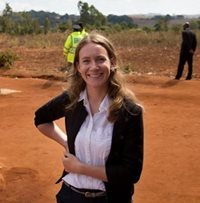Careers for Scientists and Engineers in Policy
02 November 2023 14:00 - 15:00
Eastern Daylight/Summer Time (US & Canada) (UTC -04:00)
Are you a scientist or engineer looking to explore a career path beyond academia or industry? We invite you to join Optica for a webinar on "Careers for Scientists and Engineers in Policy." During this event, you will have the opportunity to gain insights from a panel of accomplished Ph.D. scientists and engineers who have harnessed their scientific and technical expertise for policy. Our speakers will delve into their individual career journeys, detailing the reasons behind their choice to pursue this career path, and how they leverage their scientific and technical acumen in policy. They will also emphasize the crucial role played by scientists and engineers in these positions.
Learn more about the Congressional Fellowship Program
Speakers:
_jpg.png?t=638337489968010626) Dr. Tanya Das is the Senior Associate Director for Energy Innovation at the Bipartisan Policy Center. She is an engineer who uses her problem-solving skills to strengthen U.S. government initiatives that help energy innovators go from idea to market. Leveraging her experience in academia and government, she influences policy related to energy technology scaleup, the federal research landscape, public-private partnerships, manufacturing, and workforce development. She previously served the Biden Administration as the Chief of Staff of the Office of Science at the U.S. Department of Energy and spent several years in Congress advancing bipartisan policy in energy, climate change, and manufacturing. A Michigan native, she earned her M.S. and Ph.D. degrees in Electrical and Computer Engineering from the University of California, Santa Barbara and her B.S. in Electrical and Computer Engineering from the University of Michigan, Ann Arbor.
Dr. Tanya Das is the Senior Associate Director for Energy Innovation at the Bipartisan Policy Center. She is an engineer who uses her problem-solving skills to strengthen U.S. government initiatives that help energy innovators go from idea to market. Leveraging her experience in academia and government, she influences policy related to energy technology scaleup, the federal research landscape, public-private partnerships, manufacturing, and workforce development. She previously served the Biden Administration as the Chief of Staff of the Office of Science at the U.S. Department of Energy and spent several years in Congress advancing bipartisan policy in energy, climate change, and manufacturing. A Michigan native, she earned her M.S. and Ph.D. degrees in Electrical and Computer Engineering from the University of California, Santa Barbara and her B.S. in Electrical and Computer Engineering from the University of Michigan, Ann Arbor.

Dr. Sydney Lienemann is the Deputy Cabinet Secretary for Administration at the New Mexico Environment Department where she leads teams overseeing regulatory programs which include air and water quality programs, solid and hazardous waste programs, OSHA, climate change and protecting the environment for the next generation of New Mexicans.
Lienemann began her career as an AmeriCorps VISTA member to support investments in climate infrastructure and clean energy in rural Alaska. Sydney later earned her Ph.D. in physics at University of Colorado Boulder and National Institute of Standards and Technology (NIST) studying metal nanoparticles. She spent the last decade working at the intersection of climate, energy, and environmental policy. She was the MRS/Optica Science and Technology Congressional fellow and legislative assistant for climate and clean energy for U.S. Senator Mark Begich (AK), then led the Arctic energy diplomacy program at the U.S. Department of State as a AAAS Executive Fellow. She served as Chief of Staff to Alaska State Senate Minority Leader Tom Begich and Climate Advisor to the City of Albuquerque. Most recently, Sydney was the Head of Programs at Camus Energy, a clean tech start-up working to help utilities use more clean energy. In her free time, she loves to hike, bike, ski, and camp across New Mexico with her family.
.png?t=638343412086139282)
Dr. Michelle Solomon is a Senior Policy Analyst in the Electricity Program at Energy Innovation, working to accelerate the transition to a clean, affordable, and equitable electricity sector in the United States.
Prior to joining Energy Innovation, Michelle earned her Ph.D. in materials science and engineering at Stanford University, where she studied nanoparticles with applications in purifying chemicals for use in medicine and the environment. During graduate school, she also pursued an interest in energy policy and spent a summer working on electric vehicle policy at the California Energy Commission. After graduating, she transitioned full-time into policy as a Congressional Science and Engineering Fellow. As a fellow, she had the chance to work on energy and environment policy for Senator Ed Markey, focusing on a wide range of issues spanning environmental justice to electric vehicle charging. Michelle holds a Ph.D. and an M.S. from Stanford University in materials science and engineering. She also completed her B.S. in physics at Boston College.
